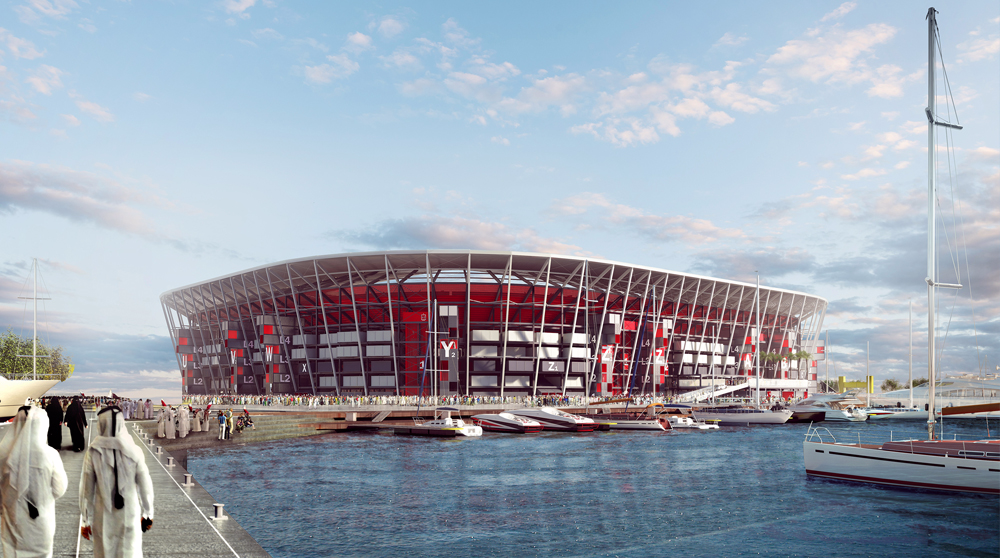December 1 – Qatar is forging ahead with its World Cup 2022 developments, winning 4-star GSAS sustainability certification for the already completed Khalifa International Stadium and unveiling a spectacular new modular and recyclable design for the soon to be built Ras Abu Aboud Stadium.
The 40,000 seater Khalifa International Stadium – the first completed 2022 World Cup venue – this week become the first stadium to be awarded a four-star rating from the Global Sustainability Assessment System (GSAS), (an award administered by Qatar-based Gulf Organisation for Research & Development)
Bodour Al Meer, the Supreme Committee for Delivery & Legacy (SC) Sustainability & Environmental Manager said of the award, “this is a major achievement for Qatar, the SC (Supreme Committee) and Aspire Zone Foundation as we strive to meet our ambitious sustainability targets in the lead-up to 2022 and beyond,” said Al Meer.
FIFA’s Head of Sustainability & Diversity, Federico Addiechi praised Qatar’s commitment to sustainability, saying: “It’s great to see that Qatar’s first stadium has successfully received certification so far in advance of the tournament. Also, the fact that such a sophisticated certification system exists and is being widely used in Qatar is very promising.
“Stadiums are at the heart of a FIFA World Cup, making them the focus for the sustainable
In order to obtain GSAS certification, developers must employ leading sustainability practices in the design, construction and operation to minimise the building’s ecological footprint. The GSAS standard includes eight assessment categories: energy, water, indoor environment, cultural and economics, site, urban connectivity, materials, and management and operations.
Meanwhile the SC has also unveiled spectacular design plans for Ras Abu Aboud Stadium – the seventh 2022 FIFA World Cup™ stadium design to be released.
The new stadium will be built using modular building blocks and will use unique materials including repurposed shipping containers.
Commenting on the design, SC Secretary General H.E. Hassan Al Thawadi said: “Innovation has always been central to our plans for delivering a historic FIFA World Cup that leaves a legacy for Qatar and the world, and there is no better example of this than the design of Ras Abu Aboud Stadium.
“This venue offers the perfect legacy, capable of being reassembled in a new location in its entirety or built into numerous small sports and cultural venues. All of this in a stadium that delivers the atmosphere fans expect at a World Cup and which we will build in a more sustainable way than ever before. I’m delighted with this design and confident that Ras Abu Aboud will become a blueprint for future mega-event planners to follow.”
This design was envisioned by Fenwick Iribarren Architects for whom senior partner and architect, Mark Fenwick, said: “We are delighted to be part of another 2022 FIFA World Cup™ project, and are very proud that our design for Ras Abu Aboud Stadium will go down in history as the first-ever moveable and reusable FIFA World Cup™ stadium. We are confident that this innovative and sustainable concept will be an inspiration for stadium developers and architects around the world, capable of creating aesthetically pleasing venues that offer new legacy possibilities.”
Ras Abu Aboud’s modular design also means construction of the venue will require fewer materials, create less waste and reduce the carbon footprint of the building process, all while reducing the time taken to build the stadium to as little as three years. Thanks to this sustainable approach to the stadium’s construction, Ras Abu Aboud will also receive a four-star Global Sustainability Assessment System (GSAS) certification.
Engineer Hilal Jeham Al Kuwari, Chairman of the Technical Delivery Office at the SC, said: “The launch of Ras Abu Aboud Stadium’s design comes three months after the design launch of Al Thumama Stadium and six months after the inauguration of Khalifa International Stadium following its renovation.2
“This succession of positive announcements highlights the continued progress being made on all World Cup projects, which have not been impacted by the illegal blockade on the State of Qatar. All of our projects are progressing per schedule and will be delivered by their target completion dates.”
Contact the writer of this story at moc.l1714502884labto1714502884ofdlr1714502884owedi1714502884sni@r1714502884ebab.1714502884kram1714502884

